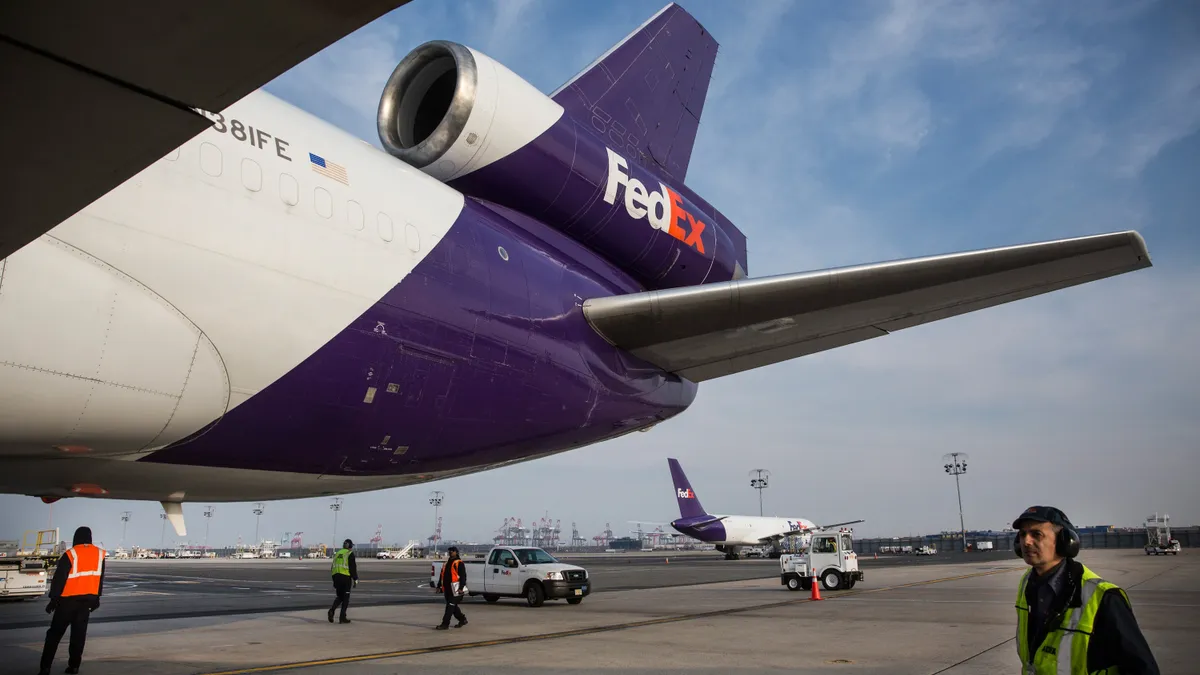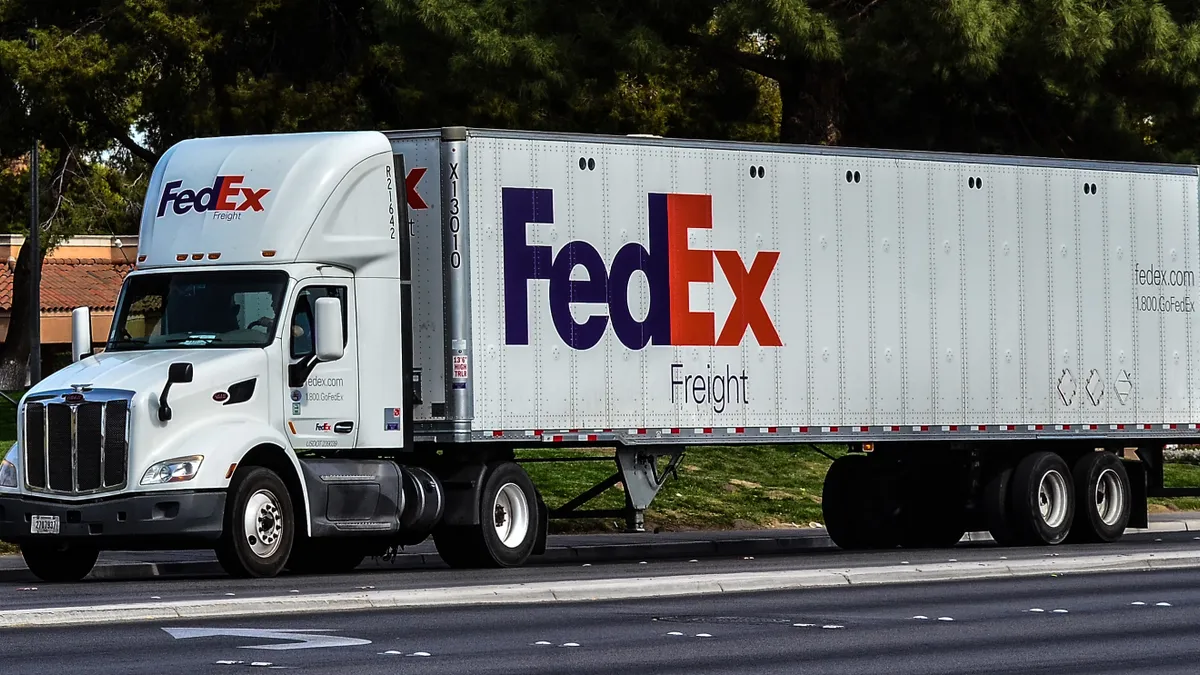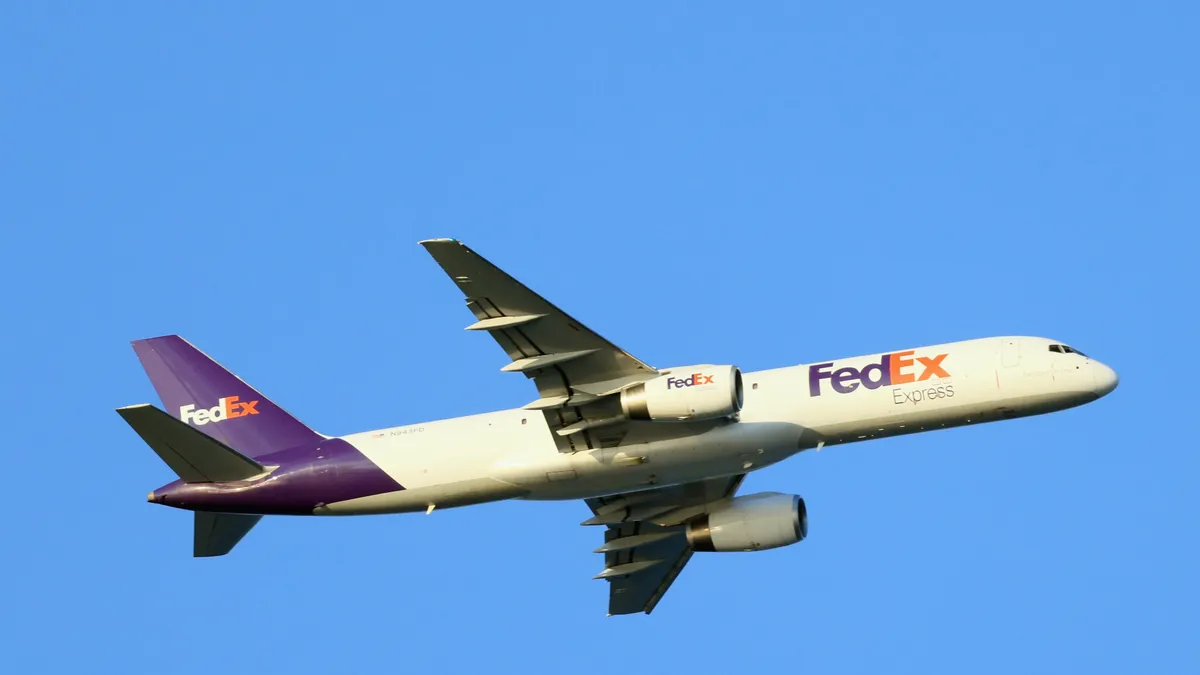FedEx's air cargo network may look much different come October, as its Express unit prepares for life without the U.S. Postal Service as a top customer.
Rival UPS will take over as the Postal Service's primary air cargo transportation provider under a contract being implemented Sept. 30, the day after the agency's deal with FedEx for airport-to-airport shipping expires. FedEx said in a statement it will make adjustments to its network once the contract ends, such as cutting structural costs currently in place to support the Postal Service's volume.
One likely target in the company's adjustments is daytime flights, which the Postal Service frequently uses. FedEx could cut 50% of its daytime flight capacity and save $1.5 billion without the contract in place, Barclays analysts said in a February research note.
Reaching that figure will depend on to what extent FedEx is willing to shrink its capacity. Experts told Supply Chain Dive that the company won't be afraid to install changes fast when the deal ends, given its aggressive approach to cost-savings in recent quarters.
"I think FedEx knew they were going to walk away from the business with the USPS, and I think what they want to do in terms of reorganizing air operations and shrinking the footprint of it is already in the books," said Dean Maciuba, managing partner, United States, for Crossroads Parcel Consulting. "They'll be able to implement these changes really, really quickly."
FedEx's large air network keeps evolving
FedEx is a giant in the air cargo space. It outranks UPS in terms of fleet size, daily departures and capacity, and it also generates more global air freight revenue than UPS, the Barclays analysts wrote. The Postal Service contract is a key piece of that success, as FedEx counted the agency as its largest Express customer as of May 31, 2023.
However, FedEx's airline is also much more expensive to maintain and operate compared to its rival. Daytime domestic U.S. flight operations, driven primarily by the Postal Service business, cost FedEx roughly $3 billion annually, according to the Barclays analysts. Meanwhile, FedEx's revenue has been pressured by reduced Postal Service activity in recent quarters, as the agency leans more on ground transportation to move volume.
"It's much smaller than what it used to be, and much smaller than what they may have already built the capability to support years ago," Pandion founder and CEO Scott Ruffin, who previously founded and led Amazon Air, said of FedEx's Postal Service business.
FedEx hasn't been hesitant to implement large-scale changes to improve its bottom line in recent quarters, particularly when it comes to cutting costs in its expensive air transportation network. Through its wide-ranging DRIVE program, FedEx is reducing routes and more efficiently deploying crews and other resources.
For the quarter that ended Feb. 29, FedEx saw $110 million worth of air network savings as a result of DRIVE. The company also has 37 jet aircraft parked, up from 20 the previous quarter.
"It is my top priority to continue to make the changes necessary to align our air network with an evolving demand environment and unlock the full profit opportunity," President and CEO Raj Subramaniam said in a March earnings call.
Daytime flights, pilot ranks seen as targets
The largest piece of the contract involves FedEx moving the Postal Service's Priority Mail shipments through a daytime hub, spoke and sorting operation centered around its Memphis, Tennessee, hub, the Barclays analysts said.
Consequently, daytime flights will be a prime target for reductions as a result of the contract loss, according to industry experts. Even when FedEx was in negotiations for a new Postal Service contract, the company had been pushing for a deal involving service to fewer markets.
“A lot of things are going to impact pilots' lives going forward on this.”

Marty Harrington
Scheduling committee chair for FedEx's pilots union, on the loss of the U.S. Postal Service contract
Non-Postal Service volume impacted by any daytime flight reductions may be ferried via ground transportation to another air cargo gateway, said Derek Lossing, a former Amazon Logistics leader who is now the founder and principal advisor of Cirrus Global Advisors.
"The last thing they want to do is go to large retailers and say, ‘We want less second-day air [volume],'" Lossing said. "They're gonna say, 'That second-day air that you give to us in New Jersey, that's going to go on a three-hour linehaul to Philadelphia before it flies to Minneapolis.' It's just a little bit different connectivity in their network."
Marty Harrington, scheduling committee chair for FedEx's pilots union, also views daytime flight capacity as a target for reductions. He said on a union podcast earlier this month that he expects it will be "reduced quite dramatically starting in October."
FedEx's "overstaffed" pilot ranks are likely to be thinned by the contract's expiration as well, but the precise impact will be unclear until post-contract flight schedules and associated staffing needs are finalized, he added.
"I know it's very difficult, but we're going to have to be patient," Harrington said. "A lot of things are going to impact pilots' lives going forward on this."























